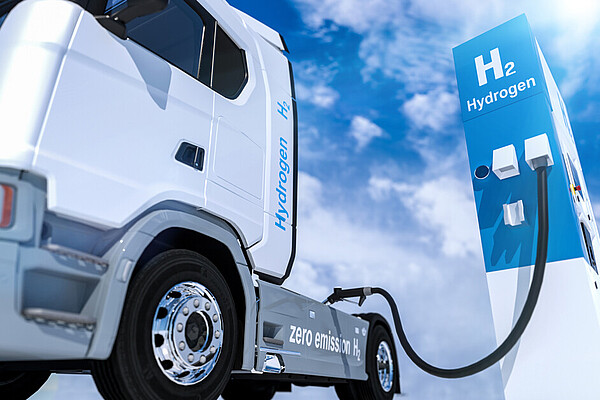- Home
- Focus Areas
- Hydrogen Technologies
- Home
- Focus Areas
- Hydrogen Technologies
Hydrogen: The Green Key to the Energy Transition
The future belongs to hydrogen. Its potential is enormous, and expectations are high: this most common chemical element in the universe is set to accelerate the energy transition and boost the economic growth. As a result, hydrogen is at the core of the ecological shift. Its significance extends beyond ecological and economic factors; it is also crucial for society - particularly for an industrialized country like Germany with its high energy demands.
Hydrogen is a versatile resource that can be utilized across various sectors - from electricity and heat supply to the chemical industry and transportation. However, as promising as this new beacon of hope is, the challenges it faces are equally significant. To fulfill the promise of a decarbonized energy system, hydrogen must be produced from green electricity or renewable biomass. Electrolysers and bioenergy plants on a gigawatt scale essential for the efficient production of this energy carrier.
Germany has the opportunity to position itself as a pioneer in hydrogen technology, unlocking new value creation and export potential. At the same time, it will contribute to decarbonization and the creation of skilled jobs. Numerous German and European programs support this pioneering technology, offering vital initial funding. These initiatives focus on hydrogen technology throughout the entire value chain: from production to transportation, infrastructure, storage and practical application.
Overcoming Challenges in Hydrogen Storage
High costs and a complex infrastructure still stand in the way of a broad market launch. A dedicated infrastructure is essential, and special safety measures are required due to hydrogen’s high flammability. This is particularly critical for storage, especially when considering the global transportation of large quantities in the future. Currently, two storage methods are under development:
- Liquid storage: Hydrogen reaches a very high density when stored at cryogenic temperatures in liquid form. This method is particularly cost-effective for transporting large volumes.
- High-pressure storage: Hydrogen is stored as a gas under extremely high pressure in tanks. The advantage of this method is the reduced volume, although the tanks must be exceptionally robust and undergo rigorous testing before approval.
Innovative Solutions for Securing Energy Supply
Technically, the fundamental questions about hydrogen as an energy source have been resolved. The main challenges now lie in the widespread introduction of the technology: it must be safe, efficient and reliable. IABG has already established two pilot plants in Lichtenau and Dresden to test various materials, technologies and processes. To ensure a high safety standard, different systems and components are required for hydrogen compared to those in today's energy infrastructure.
As with any new technology, overcoming user reservations and fears is crucial. This was also the case during the early days of electricity and the combustion engine. However, skepticism can only be addressed through transparent communication of the technology's advantages and disadvantages. At the same time, maximum safety must be guaranteed. This requires the qualification of complete systems and components for the safe handling of hydrogen. From the electrolyzer to the pressure accumulator, the entire chain must be monitored from development to approval. New safety standards and rigorous testing procedures help identify risks and prevent hazards. At IABG, we play a crucial role in this process.
How can we help you?
Please fill in the form and we will get in touch with you as soon as possible.




